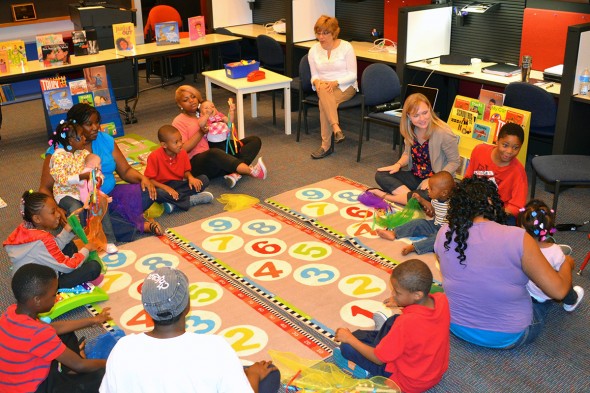Books open doors for teen moms, toddlers

“A lot of early literacy is built through play,” says Colleen Whittingham, who developed the Open Books, Open Doors program. Photo: Angela Fortune
The UIC Reading Clinic usually nurtures adolescent readers and writers, but it welcomed a new class in July with a chorus of the “Hello” song featuring all their names.
Toddlers in the Open Books, Open Doors early literacy program navigated a landscape of Cabbage Patch dolls on baby blankets, toy cars on rugs depicting maps, and alphabet bingo games on rugs full of numbers, all under the watchful eyes of their teenage mothers.
“A lot of early literacy is built through play. We model appropriate talk through play,” said Colleen Whittingham, a doctoral student in education who started the program as part of her research in family literacy.
She explained that the rugs, toys and books define space and give the toddlers a sense of routine and ownership.
“When young children know what to expect from the space, they can focus on our key learning objectives. So a lot of thought went into the physical setup,” she said.
“We try to keep books mixed in with the toys, so that’s a casual part of their play and exploration. Reading isn’t limited to story time, it’s an integrated piece.”
Whittingham designed the four-week program for 18- to 30-month-old children of teen mothers.
She recruited the mothers from the Austin neighborhood and the Simpson Academy for Young Women, an alternative public school for mothers and pregnant students.
The four mothers brought not only their toddlers, but older and younger siblings as well — 10 children in all. The clinic instructors added games and art projects to accommodate the older children.
“It’s neat how the families became a part of this,” Whittingham said.
“One of the moms told me they sang some of our songs on the bus on the way here. The older kids don’t see it as the same thing they’re doing in school.”
One Simpson student, 17-year-old Khari Johnston, watched as her 8-month-old daughter, Coriana, tried to walk, emulating the older kids. Johnston said the clinic has advantages over Coriana’s day care.
“Books. I’ve learned to explain how pictures work with words,” Johnston said. “And she loves these kids. She tries to do what they do.”
Another mother, Daphne Turner, bounced her 19-month-old, Emon, on her knee as he said, “Thank you,” in American Sign Language and her 8-year-old, Emarrion, distributed toys.
“Emon’s almost at the age of school, but he isn’t comfortable yet around a lot of people, so I brought Emarrion along. He’s kind of a helper and he participates well,” Turner said.
Each week, Whittingham introduced a new topic with new toys. The children learned about body parts via dolls and Mr. Potato Head; jobs and transportation by playing with cars and blocks; animals through animal figures in zoo, farm and jungle settings; and food through menus and real food.
While the other instructors led the children in literacy activities, Whittingham talked with each mother about literacy efforts at home: journaling for the mothers, how to share books with their children, and how to write for children.
“We send books home with them for their ownership each week, so we’re building their home libraries. Then we sing the “Good-bye” song in Spanish and send them on their way for the day,” she said.
